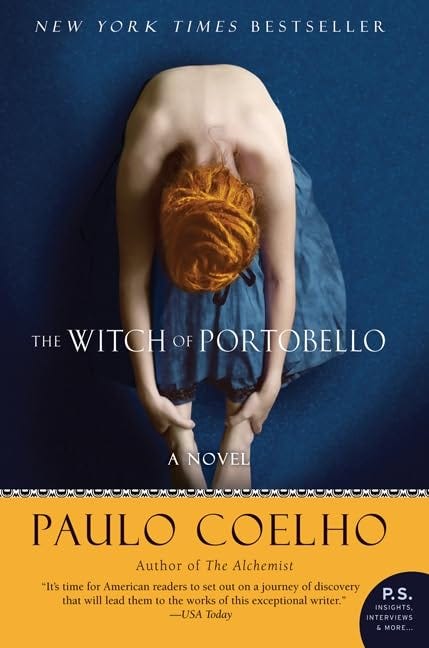No man, when he hath lighted a candle, putteth it in a Secret place, neither under a bushel, but on a candle stick, that they which come in may see the light. Luke 11:33
This is the last novel in the 10th book box set of Paulo’s book collection, which I chose for our slow Read-Along. All of them are outstanding, and I’m sure you have your favorites. The publishers of The Witch of Portobello state that the central question of this book is
‘How do we find the courage to be true to ourselves - even when we are unsure of who we are?’
I will be tackling that topic in the final part of my analysis of this book at the end of this month.
The Witch of Portobello by Paulo Coelho is a novel told through the voices of multiple narrators who knew Athena, the protagonist, at different stages of her life. Each narrator provides their perspective on Athena’s life, gradually revealing her mysterious journey of self-discovery, spirituality, and defiance of societal norms.

When I was thinking about the various themes in this book, I quickly realized that like many of Paulo’s novels,
it can be read on more than a single level. The topics explored are all worthy of our discussion so this month I am going to assume you have read the book, and I won’t be commenting through it page by page - instead I want to use the next four weeks to explore these key themes:
Week ONE - The Feminine Nature of God.
Week TWO - The Sacred in Everything.
Week THREE - ‘All Women Are Witches’.
Week FOUR / FIVE - ‘The Alterity of Sherine Khalil’ - and her Transition from The Self, to the Assumed Self and The Other.
Here’s a quick reminder of the plot and next week I will dive into Paulo’s thoughts on the Feminine Nature of God.
Plot Summary
Athena, born in Romania to a Romani mother and adopted by Lebanese parents, grows up feeling different and incomplete. She’s raised in a comfortable, middle-class family in Beirut, but her adoptive mother senses a deep, rebellious spirit in her. As she grows, Athena feels a strong, mystical connection to the divine that propels her on a lifelong quest for spiritual meaning. She believes she has an unknown purpose and is often haunted by her origins and the question of who she truly is.
After her family moves to London due to the Lebanese Civil War, Athena enters adulthood. She marries and has a child at a young age, but the marriage falls apart. This triggers an intense desire within her to find inner peace and a true sense of belonging. She becomes involved in various religious and mystical practices, each chapter delving into Athena’s encounters with different spiritual guides and mentors, who offer her knowledge of different belief systems and philosophies. Her search is focused on connecting with the divine feminine, which she sees as her life’s calling.
As Athena explores her spirituality, she faces skepticism, rejection, and fear from others. She becomes involved in dance, particularly a form of trance dance that allows her to channel divine energy. This dance becomes a symbol of her liberation, a way to express the mysticism she feels so deeply. Her increasingly unconventional practices and her role as a spiritual guide lead her to be seen as a modern-day witch by the public, especially around Portobello Road in London, where she begins conducting rituals and gatherings.
Her charisma and mysterious aura attract followers, but she also gains enemies. Many view her as dangerous and blasphemous, especially as her ideas challenge traditional religious beliefs. The media and local authorities scrutinize her, and she is accused of manipulating her followers. Despite this, Athena feels she is achieving her purpose by helping others connect with the divine within themselves. Her ultimate act of liberation comes when she willingly “destroys” her constructed self, leading her followers to learn to carry on without her.
Through the accounts of those who knew her — her ex-husband, her adoptive mother, her spiritual mentors, and her followers — Athena's story is revealed as a complex journey of self-destruction and rebirth. She becomes a mythical figure, symbolizing the struggle between individuality and societal norms.
Paulo has commented:
"This book reflects my own journey in many ways, the constant search to understand who we are and why we are here. Athena’s story is ultimately about the courage it takes to look inside and confront the divine within us, something that many people fear because it means going against what society dictates."





